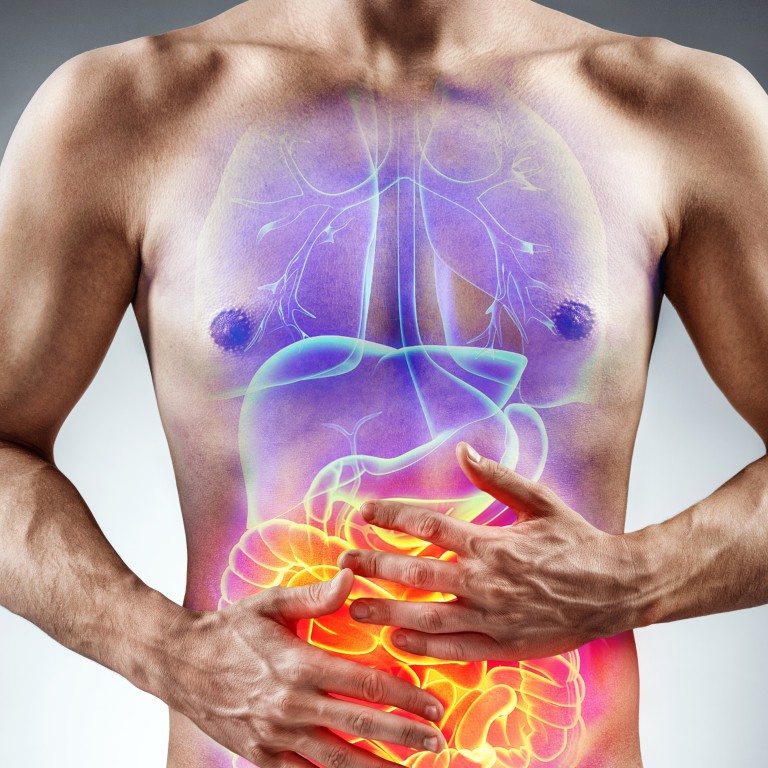
Coronavirus can infect intestine as well as lungs, says study
- Dutch scientists found that lab-grown intestinal cells became infected with both the Sars and Covid-19 viruses, which attached themselves to a receptor enzyme
- Conclusions are supported by research from China that found patients suffering from diarrhoea had more severe symptoms
Covid-19 can infect the intestine as well as the respiratory system, according to new research.
Scientists have previously found genetic material from the virus that causes the disease, or the virus itself, in patients’ stools– raising concerns that it could be transmitted through faecal matter.
China’s health authority also recognised diarrhoea as a symptom of the disease in its official treatment guidelines.
However, scientists were unsure whether the intestine could become infected and the coronavirus – officially known as Sars-CoV-2 – multiply there, but recent studies by Dutch and Chinese researchers support this theory.
The Dutch study, published in Science magazine on May 1, shows that the new virus can infect the absorptive cells – known as entrocytes – that line the intestine’s inner surface in the same way that severe acute respiratory syndrome (Sars) does.
Both viruses can attach themselves to a receptor enzyme known as ACE2, which is found in abundance in the cells.
The researchers – from the Hubrecht Institute in Utrecht, Erasmus University Medical Centre in Rotterdam and Maastricht University – grew a cell culture model of the intestine to see how the cells lining the intestine responded to Sars and the new coronavirus.
Coronavirus may lurk deep in lungs after patients recover, study suggests
They found that within 60 hours the number of infected cells had “dramatically increased”, while a viral defence mechanism – known as interferon stimulated genes – had been activated.
“The observations made in this study provide definite proof that [the new coronavirus] can multiply in cells of the gastrointestinal tract,” said Bart Haagmans, one of the lead researchers from Erasmus University.
“However, we don’t yet know whether [the new coronavirus] present in the intestines of Covid-19 patients plays a significant role in transmission. Our findings indicate that we should look into this possibility more closely.”

The Dutch researchers said they were also surprised to find that the number of ACE2 receptors in the intestinal cells made little difference to the rate at which they became infected – suggesting that even low levels of the receptor enzyme would be enough to allow the virus to enter the body.
The team plans to use lab grown cell cultures to examine the differences between infections in intestinal cells and the lungs – another ACE2-rich area.
First coronavirus autopsy highlights how illness targets lungs
The Dutch research echoes two recent studies by Chinese researchers at Sun Yat-sen University (SYSU) in Guangdong.
Researchers from the Fifth Affiliated Hospital of the SYSU, found that out of a group of 73 Covid-19 patients, ribonucleic acid (RNA) from the coronavirus was present in the stools of 53 per cent.
Around 23 per cent also continued to give positive results after their respiratory samples tested negative.
The researchers said their findings, published in the journal Gastroenterology this month, suggested that the virus could infect the intestine and it could be transmitted by faecal matter, for example in the form of particles.
Meanwhile, their counterparts from the Sixth Affiliated Hospital retrospectively analysed data from 230 Covid-19 patients from Guangdong, Hubei and Jiangxi provinces between January 19 and March 6.
They found 21 per cent had diarrhoea, and there was a clear correlation between this and suffering more severe symptoms, such as needing ventilator support or treatment in intensive care.
The findings were published on April 15 in The Lancet Gastroenterology & Hepatology.

